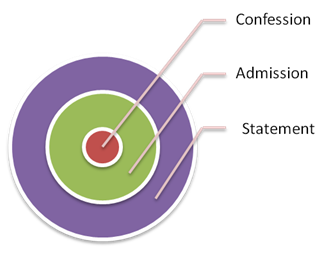Section -24 – 30
EVIDENTIARY VALUE OF CONFESSION
- A confession is substantive evidence against its maker, so that it has been duly recorded and suffers from no legal infirmity, it would suffice to convict the accused who made the confession, though as a matter of prudence, the Court expects some corroboration before acting upon it.
- Even then slight corroborationwould suffice. But before acting upon a confession, the Court must be satisfied that it is voluntary and true.
- A confessional statement made by the accused before a magistrate is a good evidence and accused be convicted on the basis of it. A confession can obviously be used against the maker of it and is in itself sufficient to support his conviction.
- If it is found that the confession was made and was free, voluntary and genuine there would remain nothing to be done by the prosecution to secure conviction. If the court finds that it is true that the accused committed the crime it means that the accused is guilty and the court has to do nothing but to record conviction and sentence him
- Now the settled law is that a conviction can be based on confession only if it is proved to be voluntary and true. If corroboration is needed it is enough that the general trend of the confession is substantiated by some evidence which would tally with the contents of the confession. General corroboration is enough.
- In AghnooNagesiaVs. State of Bihar , AIR 1966 SC 119, it has been held that,
- “A statement contained in the FIR furnished by one of the accused in the case cannot, in any manner, be used against another accused. Even as against the accused who made it, the statement cannot be used if it is inculpatory in nature nor can it be used for the purpose of corroboration or contradiction unless its maker offers himself as a witness in the trial. The very limited use of it is as an admission under Sec.21 of the Evidence Act against its maker alone unless the admission does not amount to confession.”
- Section 80 of the Indian Evidence Act give the evidentiary value to the judicial confession and expresses that a confession made in the presence of magistrate or in the court which is recorded by the magistrate as prescribed by the law then such confession shall be presumed to be true and genuine confession and the accused can be tried with the offence.
- Section 164 of CrPC empowers magistrate to record confession so it is not necessary that which magistrate recorded the confession unless he is restricted to record the confession. Hence, for raising the presumption the identity of the accused must be clear and proved in the confession to persecute him for the guilt of the offence he committed.
- Value of extra-judicial confession- extra-judicial confessions are not usually considered with favour but that does not mean that such a confession coming from a person who has no reason to state falsely and to whom it is made in the circumstances which support his statement should not be believed.
- In State of Karnataka v. A.B.Nag Raj there was allegation that the deceased girl was killed by her father and step-mother in the National park. The alleged extra-judicial confession was made by accused during detention in forest office. No mention of said confession in report given to police nor any witness present there mentioning about the same confession. This extra-judicial confession cannot be relied on.
The statement is a genus; admission is the species and confession is the sub-species –
Supreme Court in the Case of Sahoo v.State of UP (1965)









No comment